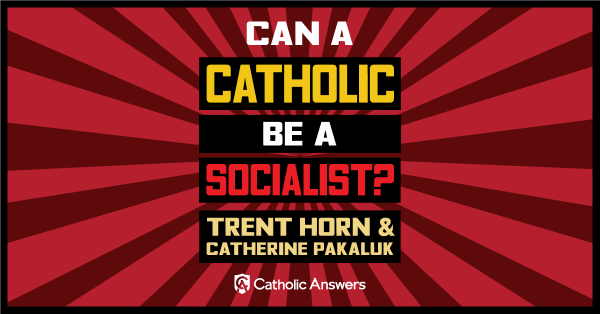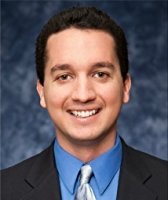

-by Trent Horn
&

Catherine R. Pakaluk, PhD
“Catholics must not pursue policies that result in de facto socialism even if it’s called something else.
The Catechism of the Catholic Church says, “The Church has rejected the totalitarian and atheistic ideologies associated in modern times with ‘communism’ or ‘socialism’” (2425). This does not mean, however, that Catholics can embrace a kinder, “Christian” socialism in its place. Pope Pius XI famously declared, “Religious socialism, Christian socialism, are contradictory terms; no one can be at the same time a good Catholic and a true socialist” (Quadragesimo Anno, 120).
In response, some people say this applies only to Marxist, or authoritarian, socialism. They claim Catholics may (or even should) embrace what is popularly called “democratic socialism.”
Modern “democratic socialism” in the U.S. is the fruit of Michael Harrington, who left Dorothy Day’s Catholic Worker movement in the 1950s. Harrington had described it as “as far left as you could go within the Church,” and soon he left the Church too to become an atheist, the author of a best-selling book on poverty called The Other America, and the founder of the Democratic Socialists of America (DSA). He believed capitalism was dying out and that it was necessary to rescue the teachings of Karl Marx from authoritarian Communists who had perverted them.
Instead of a centralized economy, such as that of the Soviet Union, Harrington argued for “decentralized, face-to-face participation of the direct producers and their communities.” The current platform of the modern DSA says that since “we are unlikely to see an immediate end to capitalism tomorrow, DSA fights for reforms today that will weaken the power of corporations and increase the power of working people.”
Instead of replacing markets with “an all-powerful government bureaucracy,” the DSA believes that “social ownership could take many forms, such as worker-owned cooperatives or publicly owned enterprises managed by workers and consumer representatives.” In an interview with National Public Radio, one DSA chapter founder gave this analogy to explain how a “worker cooperative” would achieve social ownership in a way that is superior to corporate capitalism:
Let’s say you were negotiating at a bargaining table with workers in a bakery, and the workers said, “Look, we want more than a quarter of the bread; we want half of the bread, or we want two-thirds of the bread.” The socialist would say, “Actually, we want the bakery. We want to control it all, for all of our benefit.”
Some defenders of democratic socialism don’t stress this anti-business mentality and simply focus on government entitlement programs. Neal Meyer, a contributor to Jacobin and a member of the New York City Democratic Socialists of America, says democratic socialists simply “want to build a world where everyone has a right to food, health care, a good home, an enriching education, and a union job that pays well.”
No one disputes that governments have a moral duty to make sure citizens have the ability to access the basic goods of life such as food, education, and medicine. But how the access to those goods is provided is something people can debate, and some ways of providing it are contrary to Catholic social doctrine.
When it comes to “democratic socialism,” for instance, a Catholic can advocate for policies that cohere with Catholic social teaching, such as a preferential option for the poor or the right of laborers to form a union. This is what Pope Benedict XVI referred to when he said, “In many respects, democratic socialism was and is close to Catholic social doctrine and has, in any case, made a remarkable contribution to the formation of a social consciousness.”
But Catholics cannot pursue policies that result in de facto socialism, even if it’s called something else. Pope St. John Paul II, for example, was aware of proposals such as Meyer’s that argue for the universal right to “a union job that pays well.” He said in response that “the state could not directly ensure the right to work for all its citizens unless it controlled every aspect of economic life and restricted the free initiative of individuals.”
So, in order to analyze democratic socialism, we must distinguish social welfare policies Catholics can reasonably disagree about with socialist policies no Catholic can support.
The government can provide benefits to people through social welfare programs such as food stamps or education grants, and people are free to gauge and debate the effectiveness and value of such programs. John Paul II warned, though, that if the “welfare state” grew too large, it would result in “a loss of human energies and an inordinate increase of public agencies, which are dominated more by bureaucratic ways of thinking than by concern for serving their clients, and which are accompanied by an enormous increase in spending” (Centesimus Annus 48).
In contrast to social welfare programs, the government could provide these goods directly through socialist programs such as government-run schools, hospitals, and grocery stores. Since socialism is often gradually introduced to societies through public policy, Catholics should approach with a healthy dose of skepticism government policies that seek to nationalize entire industries.
Of course, the existence of some nationalized industries does not mean a country has embraced full-fledged socialism. For example, having government-run schools in the United States does not mean we are a socialist country such as the Soviet Union (though that wasn’t for a lack of trying).
In 1922, Oregon tried to outlaw private and religious schools, and it was only a 1925 Supreme Court decision that kept the state from winning a monopoly on education. Pope Pius XI quoted this decision in Divnii Illius Magistri when he wrote, “The child is not the mere creature of the state” (37). Contrast this with Karl Marx’s collaborator Friedrich Engels, who dreamed of a time when “the care and education of the children become a public affair; society looks after all children alike.” In fact, in Sweden (a country many Democratic socialists hold up as an ideal), homeschooling is illegal, and in neighboring Finland private schools are practically nonexistent.
In the United States, the government on many levels provides many health care services. Yet a fully socialist health care system—an idea that more political candidates are beginning to float and more voters entertain—would be another example of central planning that should concern Catholics.
If the government has the only say over what services a hospital offers, then Catholic hospitals (to whatever extent they could remain identifiably so) could be mandated to provide contraception and to perform sterilizations, abortions, and so-called “sex-reassignment” surgeries, among other morally objectionable things. There would also be concerns about the state’s rationing of health care, potentially denying certain ordinary treatments to disabled patients and imposing euthanasia in their place.
Tempting though the idea may be to some, it’s hard to see how Catholics can help create, in Meyer’s words, “a democratic road to socialism.” The Church’s condemnations against socialism would have remained the same even if Lenin, Mao, Pol Pot, and other socialist leaders had been elected through a democratic process. Moreover, the Church has been aware of a peaceful “moderate socialism” for a long time and still rejects it as being a promotion of Christian values under the socialist banner with an eye toward enacting true socialism in the future.
Pope Pius XI said, “Such just demands and desire have nothing in them now which is inconsistent with Christian truth, and much less are they special to socialism. Those who work solely toward such ends have, therefore, no reason to become socialists” (Quadragesimo Anno 115). Thirty years later Pope John XXIII reaffirmed the Pope’s contention saying:
Pope Pius XI further emphasized the fundamental opposition between Communism and Christianity, and made it clear that no Catholic could subscribe even to moderate socialism. The reason is that socialism is founded on a doctrine of human society which is bounded by time and takes no account of any objective other than that of material well-being. (Mater et Magistra, 34)
A 1949 Gallup poll asked Americans, “What is your understanding of the term socialism?” The majority answer, at 34 percent, was “state control of business.” Today, only 17 percent of people identify socialism in this way. The most popular answer in 2019, comprising 33 percent of respondents, was an identification of socialism with “equality” and government provision of benefits and social services.
There have always been people who tried to achieve socialism’s goals without relying on its radical methods. These socialists wanted to end poverty, but they were skeptical about using a large, central government established through a people’s revolt in order to do it. Tellingly, those who did believe in that method, like Marx’s partner Friedrich Engels, were immediately suspicious of their “democratic” opponents:
These democratic socialists are either proletarians who are not yet sufficiently clear about the conditions of the liberation of their class, or they are representatives of the petty bourgeoisie, a class which, prior to the achievement of democracy and the socialist measures to which it gives rise, has many interests in common with the proletariat.
Democratic socialists in the nineteenth century formed labor parties in European countries that pushed for worker reforms instead of worker revolutions, and many of them still exist today. Democratic socialists are also a rising force in American politics, and in order to see if their brand of socialism is compatible with Catholicism we need to examine their early-twentieth-century roots.
As we show in our new book Can a Catholic be a Socialist?, socialism is evil in principle because it deprives people of their natural rights and treats them as products of the state to be sculpted and used instead of creations of God to be dignified and respected. Furthermore, socialism is unworkable because it doesn’t “see the world as it really is” and, as a result, leads to physical evils such as food shortages and the neglect of natural resources and environments. The physical and moral evils of socialism become clear once one examines the history of both socialism and the Catholic Church’s response to it.”
Love, truth, freedom,
Matthew



